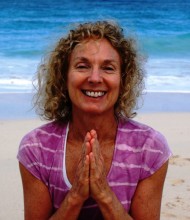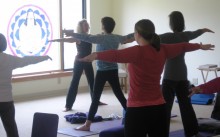One of life’s pleasures is the validation of our own experience. There’s a moment of deep connection to something larger than small self when what we have found on our own through regular practice or learned from a teacher to self-soothe or to regulate mood, is documented in an ancient text or a book by a contemporary spiritual teacher, or proven by new scientific evidence. I found that “yes” moment of validation again and again this month, as I read both books reviewed below. Both Tara Brach’s new True Refuge and Sat Bir Khalsa’s Your Brain on Yoga provided that warm “ah-ha” feeling of connection, and the new research studies summarized in this 48th edition of the newsletter, supported the ways in which I and many of you practice and teach yoga and meditation.

I’m thrilled to announce here many new LifeForce Yoga training opportunities for professionals and every day practitioners, including a new online learning module and a 200-hour yoga Yoga Alliance approved LifeForce Yoga Teacher Training, led by me and my dear friend and colleague, senior Kripalu Yoga Teacher Trainer, Rudy Peirce, MA, ERYT-500.
I look forward to our meeting again on the yoga path.
a warm namasté,
Amy
In this Issue
- Research: Second International Conference on Yoga for Health and Social Transformation
- Research: More than 100 Studies Prove Yoga’s Mental Health Benefits
- Research: Yoga Reduces Arrhythmia, Anxiety & Depression
- Training News: LifeForce Yoga Practitioner Online Training
- Training News: LifeForce Yoga Practitioner Training at Yogaville
- Training News: LifeForce Yoga 200-Hour Teacher Training
- Professional Training Opportunities
- Review: True Refuge: Finding Peace and Freedom in Your Own Awakened Heart by Tara Brach
- Review: Your Brain on Yoga by Sat Bir Khalsa
- News: Free Interview with Amy Weintraub by Author Mariana Caplan, PhD
- News: Free Online Training ~ Thriving as a Yoga Teacher, with Laura Cornell, PhD
Research: Second International Conference on Yoga for Health and Social Transformation
Several papers presented at the research conference organized by the Patanjali Research Foundation in Haridwar, India, and directed by Shirley Telles, MBBS, M.Phil., Ph.D. support yoga nidra as a means for behavioral change. The first study suggests that the regulation of emotions could be occurring through the calming of the autonomic nervous system as measured by breathing patterns. The small study examined respiratory patterns in students enrolled in schools in Australia for disruptive behavior before, during and after yoga nidra relaxation. As compared to controls, the seven students with a mean age of 12.6, had unstable and a predominance of thoracic breathing (upper chest) before and after their progressive relaxation, but stable breathing during the practice. For more details about this study, write to the primary investigator, Pauline S.Jensen: pauline.jensen@uni.sydney.edu.au
Other studies of yoga practices that demonstrated significant improvement in mental health included the psychological benefits of yoga as measured in a prison population in the UK by primary investigator Miguel Farias, miguel.farias@psy.ox.ac.uk; two studies that demonstrated the benefits of shavasana (corpse pose/relaxation) or yoga nidra, for anxiety one by primary investigator Prafull Kotalwar, parfull_kotalwar@yahoo.com and the other by Rajkumar Rajak, rajkumarrajak30@yahoo.com; two different studies on the psychological benefits of prayer/mantra chanting, one presented by Manikya Shreevatsa, jkbalsurbhartisaritasamiti@gmail.com, and the other by Reetika Choradia, reetika.jain07@gmail.com, and a study that correlated a decrease in depression/anxiety with participation in a 7-day yoga camp, presented by Ankur Kumar, ankurkumar5678@gmail.com. Two studies examined the benefits of yoga in hypertension treatment. One by Satinder Paul, satinderpaul41@yahoo.in looked at pranayama, the other presented by Subodh Prakash, art.llrm@gmail.com, looked at the role of “yoga therapy.” For more details on these studies, please write the authors directly.
Research: More than 100 Studies Prove Yoga’s Mental Health Benefits
A new review of over 100 studies on the benefits of yoga for mental health has shown that yoga has a positive effect on psychiatric problems, from mild depression and sleep troubles to schizophrenia. The study called “Yoga on our minds: a systematic review of yoga for neuropsychiatric disorders” was published in the journal Frontiers in Psychiatry. The authors found that yoga influences key parts of the body that are thought to play a role in mental health in similar ways to antidepressants and psychotherapy. Scientists at Duke University Medical Center reviewed the findings of previously published research, all of which had looked at the effects of yoga on major psychiatric disorders.
In one study of 69 older adults with mild depression, weekly yoga sessions reduced depression scores by 40 percent at six months. A comparison group of adults who didn’t take yoga, and a group that practiced a form of complementary medicine called Ayurveda, did not show changes in depression scores.
In another study, seven weeks of yoga improved sleep quality and reduced the need for sleep aids in 39 adult cancer patients receiving chemotherapy. People who did not take the yoga sessions (control group) did not have an improvement in sleep.
Yoga practice improved symptoms of both schizophrenia and ADHD in people who were on medication.
One of the study’s authors, Dr Murali Doraiswamy, professor of psychiatry and medicine at Duke, claimed that if yoga’s impact on mental health was available in drug form, ‘it would be the best selling medication world-wide’. He added: ‘The search for improved treatments, including non-drug-based, to meet the holistic needs of patients is of paramount importance and we call for more research into yoga as a global priority.’
http://www.ncbi.nlm.nih.gov/pubmed/?term=a+systematic+review+of+yoga+for+neuropsychiatric+disorders
Research: Yoga Reduces Arrhythmia, Anxiety & Depression
In a study published in the Journal of the American College of Cardiology in January, researchers found that patients with Paroxysmal Atrial Fibrillation (arrhythmia) benefited from a three month program of twice weekly 60-min yoga training. Study authors concluded that yoga improves symptoms, arrhythmia burden, heart rate, blood pressure, anxiety and depression scores, and several domains of quality of life.
http://content.onlinejacc.org/article.aspx?articleid=1567301
Training News: LifeForce Yoga Practitioner Online Training

The LifeForce Yoga Healing Institute is launching its first online course. The 13 hour course, plus materials, can be taken for credit for $210, as Module B in the LifeForce Yoga Practitioner Training. The course begins live on Thursday, April 18th at 1pm PT, or you can listen the week between each of the four 2-hour webinars. It includes four two-hour webinar sessions on Creating the Safe & Sacred Container, Pranayama & Meditation, Mantra & Mudra, Trauma, and a two-hour live phone call to talk about clinical application with LFYP Training director and author of Yoga for Depression and Yoga Skills for Therapists Amy Weintraub and LifeForce Yoga Mentor and psychotherapist Ann Friedenheim, MS, MA, CAADC, RYT-200, LFYP-2. Those taking the module for credit in the LFYP Training will also have study partner phone calls, reading assignments and homework and receive the LifeForce Yoga Practitioner Training Manual. If you are not taking the LFYP Training in 3 Modules, but you would like the online learning, sign up for 8 hours of webinar; 2 hours of live call. 10 hours for $150. Just enter code lfy-webinar-promo-2013 at checkout.
To register, yogafordepression.com/register-for-lfyp-training-module-b
Training News: LifeForce Yoga Practitioner Training at Yogaville

For the first time, we will be offering our 58-hour residential LFYP level one training at Satchidananda Ashram in Yogaville, near Charlottesville, VA. This venue has the amenities of the West, the heart and soul of India, and is a perfect location for a deep immersion in yoga. Go on retreat with Amy and a faculty of LifeForce Yoga Practitioners who are yoga and mental health professionals. You will learn evidence-based yoga practices that do not require a yoga mat to serve individuals and groups in health care and yoga settings, even as you offer yourself tools for your own self-care.
For more information: yogaville.org/products/lifeforce-yoga-practitioner-training-for-depression-and-anxiety-level-1
Training News: LifeForce Yoga 200-Hour Teacher Training
 Become a LifeForce Yoga Teacher in a beautiful and peaceful setting with caring professional yoga instructors! Whether you’re a health practitioner seeking to deepen your own practice or offer yoga to those you serve or you are an avid yoga practitioner, you can become certified as a LifeForce Yoga Teacher. The LifeForce Yoga Healing Institute, a Yoga Alliance registered school is offering its first 200-hour, training at the Satchidananda Ashram at Yogaville in two 13-day sessions: Nov 30 – December 13th, 2013 and Feb 23 – Mar 7, 2014. The training will be directed by yoga and mental health pioneer Amy Weintraub, ERYT-500. MFA and master Kripalu Yoga Teacher Trainer, Rudy Peirce, ERYT-500, MA. Senior Kripalu teacher Grace Jull, ERYT-500, MA, LMT, founder of Grace’s Anatomy, is a guest teacher in the training. The faculty includes LifeForce Yoga Practitioners, both senior yoga teachers and mental health professionals, including Rose Kress, RYT-500, LFYP-2, as program manager.
Become a LifeForce Yoga Teacher in a beautiful and peaceful setting with caring professional yoga instructors! Whether you’re a health practitioner seeking to deepen your own practice or offer yoga to those you serve or you are an avid yoga practitioner, you can become certified as a LifeForce Yoga Teacher. The LifeForce Yoga Healing Institute, a Yoga Alliance registered school is offering its first 200-hour, training at the Satchidananda Ashram at Yogaville in two 13-day sessions: Nov 30 – December 13th, 2013 and Feb 23 – Mar 7, 2014. The training will be directed by yoga and mental health pioneer Amy Weintraub, ERYT-500. MFA and master Kripalu Yoga Teacher Trainer, Rudy Peirce, ERYT-500, MA. Senior Kripalu teacher Grace Jull, ERYT-500, MA, LMT, founder of Grace’s Anatomy, is a guest teacher in the training. The faculty includes LifeForce Yoga Practitioners, both senior yoga teachers and mental health professionals, including Rose Kress, RYT-500, LFYP-2, as program manager.
In this training you will learn how to guide truly transformational yoga that includes the LifeForce Yoga evidence-based techniques of asana, pranayama, sounding, relaxation and meditation for vitality, healing and mood management based on the techniques in Amy’s Yoga For Depression, A Compassionate Guide to Relieve Suffering.
Full details
To apply to become a LifeForce Yoga Teacher: yogafordepression.com/200-hour-lfy-yoga-teacher-training/#tuition-application
Professional Training Opportunities
In addition to the LifeForce Yoga Practitioner and LifeForce Yoga Teacher Trainings, Amy Weintraub will be a featured presenter at mental health conferences and learning programs that offer CEUs for health professionals at the following venues:
The Annual Psychotherapy Networker Symposium at the Omni Shoreham in Washington DC, March 21-24: Amy will be offering a day-long yoga workshop, a half-day workshop on yoga meditation applicable in a clinical setting, teaching the early morning yoga classes and the afternoon meditations. In addition, there are over 175 workshops on a vast range of clinical topics, presented by a faculty that reads like a “Who’s Who” of Psychotherapy, as well as plenty of networking events that will allow you to connect with other members of your professional tribe. Featured speakers include David Burns, Tara Brach, Diane Poole Heller and K. Anders Ericsson. You can get all the details you need on the Networker Symposium website.
15th Annual International Energy Psychology Conference at the Hyatt Regency Hotel in Reston, VA May 30-June 02: Amy is an invited speaker, talking about “Integrating Yoga-Based Energy Practices into Therapy.” In addition, there will be 60 other great presentations by leaders in the field of energy psychology and keynotes by Joan Borysenko,PhD, best-selling author of ten books including Minding the Body, Mending the Mind, Eben Alexander, MD Academic Neurosurgeon and best-selling author of Proof of Heaven: A Neurosurgeon’s Journey into the Afterlife, David Feinstein, PhD, foremost thought leader in the field of Energy Psychology and award-winning author of Energy Psychology Interactive and The Promise of Energy Psychology, Roger Jahnke, OMD Co-founder of the National Qigong Association and author of The Healer Within, and renowned physicist William Tiller, PhD author of four books including Science and Human Transformation.
Click here to go to the Conference website.
34th CAPE COD INSTITUTE, June 17 – August 23. From July 22 – 26th, Amy is offering a 15-hour course for healing professionals called “LifeForce Yoga: Empower Your Clients to Manage Their Moods. The CAPE COD INSTITUTE is a summer long series of 28 week-long in-depth continuing education courses for mental health and management professionals, taught by leading contributors to knowledge and practice. Sessions are held Monday-Friday mornings, leaving the afternoons free for leisure and study. The courses are approved for continuing education credit for various professional groups. For more information, click here.
Review: True Refuge: Finding Peace and Freedom in Your Own Awakened Heart by Tara Brach
 There are a handful of writers I turn to when I am ready to let go of something I thought I understood about life and my place in it. These are writers I trust, because they’ve let go of posturing. They approach the journey of being human with humility and a depth of self-inquiry that inspires me to keep going. Psychologist and meditation teacher Tara Brach is such a writer. In her honesty, she holds up a mirror to her own humanness and then turns it toward the reader. In her new book, True Refuge, the author of Radical Acceptance, guides us into self-inquiry with authenticity and compassion. The book combines elements of self-revealing memoir, instructive stories about her meditation students and psychotherapy clients with meditation instruction suitable for a beginner, meditative inquiry suitable for an advanced practitioner, and 26 beautiful meditation and reflection scripts with which to practice. You hear Tara’s compassionate voice throughout, even at her fiercest look at her own tendency to judge.
There are a handful of writers I turn to when I am ready to let go of something I thought I understood about life and my place in it. These are writers I trust, because they’ve let go of posturing. They approach the journey of being human with humility and a depth of self-inquiry that inspires me to keep going. Psychologist and meditation teacher Tara Brach is such a writer. In her honesty, she holds up a mirror to her own humanness and then turns it toward the reader. In her new book, True Refuge, the author of Radical Acceptance, guides us into self-inquiry with authenticity and compassion. The book combines elements of self-revealing memoir, instructive stories about her meditation students and psychotherapy clients with meditation instruction suitable for a beginner, meditative inquiry suitable for an advanced practitioner, and 26 beautiful meditation and reflection scripts with which to practice. You hear Tara’s compassionate voice throughout, even at her fiercest look at her own tendency to judge.
Since the publication of Radical Acceptance, Tara has faced a difficult diagnosis that has limited her capacity to do many of the things she loves. She has practiced and taken refuge in all the elements about which she so elegantly writes–facing the truth; opening to love and being awareness. “We find true refuge,” says the author, “whenever we recognize the silent space of awareness behind all our busy doing and striving. We find refuge whenever our hearts open with tenderness and love. We find refuge whenever we connect with the innate clarity and intelligence of our true nature.” To summarize so briefly the tenants of this book is to do it a disservice. It is in the reading, page by page, that the gift of Tara’s prose is offered and received by the reader in the form of the possibility to transform old patterns of thinking and reacting. “Truth,” she says, “can only be discovered in the aliveness of the moment. Love can only be experienced in this very heart, here and now. Awareness can only be realized as we discover the space and wakefulness of our own mind.” But this is not just a philosophical treatise on true refuge as outlined by the Buddha and reinterpreted by Tara Brach. We are given the means, chapter by chapter, of discovering for ourselves true refuge in our “own awakened heart.”
Order your copy.
Review: Your Brain on Yoga by Sat Bir Khalsa
 Sat Bir Khalsa has been engaged in the field of yoga research for ten years and is a longtime Kundalini Yoga practitioner and teacher. From his appointment at Harvard as an assistant professor of medicine, he directs the research for both the Kundalini Research Institute and Kripalu’s Institute for Extraordinary Living, so he is in the ideal position to offer us a synthesis of what we have learned so far about how yoga effects, not only mind and body, but how it can actually change our brains. This brief but informative book is a Harvard Medical School guide, and is available as a download.
Sat Bir Khalsa has been engaged in the field of yoga research for ten years and is a longtime Kundalini Yoga practitioner and teacher. From his appointment at Harvard as an assistant professor of medicine, he directs the research for both the Kundalini Research Institute and Kripalu’s Institute for Extraordinary Living, so he is in the ideal position to offer us a synthesis of what we have learned so far about how yoga effects, not only mind and body, but how it can actually change our brains. This brief but informative book is a Harvard Medical School guide, and is available as a download.
Through case studies and lengthy anecdotes, Khalsa illustrates the vital nature of stress as part of the human condition, in both its positive and negative aspects. “What yoga and meditation can do,” he says, “is to facilitate a change in your perception of the stress in your life and provide you with effective skills to cope with it.” The book provides a summary of current research on the effects of yoga on mood and explains that research for the average, non-scientist reader. Khalsa talks about meditation as a “mental time-out” that provides our brains a “much-needed breather.” Meditation does this, he says, by fixing the attention, so that we experience less mind-wandering. “Once your are in the attention mode,” he explains clinically, “you engage the frontal lobe connections that directly impact the limbic system, which is the part of your brain dedicated to your emotions. By meditating and controlling your attention, you can establish more control over what you perceive as a significant stressor, reduce activity in your limbic system and your emotional reactivity, and thereby diminish your stress response.” Meditation and yoga actually change the brain by thickening the cerebral cortex. Khalsa points out that practice can reverse the negative effect of trauma in the brain.
Khalsa began his research career in the area of yoga and its effect on sleep and is well published in that area. Included in the book are evidence-based yoga exercises and meditations for sleep. There are also yoga meditations, mostly from the Kundalini tradition as taught by Yoga Bhajan, for boosting the immune system, reducing blood pressure, improving memory, strengthening vitality, boosting telomerase (an anti-aging enzyme), raising sexual energy and balancing mood. Whether you are a yoga practitioner or health professional, you will want Your Brain on Yoga on your eReader. It’s an easy read and a good reference for anyone interested in natural treatments for what ails us.
Order your copy. Available as an ebook only.
News: Free Interview with Amy Weintraub by Author Mariana Caplan, PhD
Here’s what yogi-psychotherapist Mariana Caplan, author of The Guru Question and Eyes Wide Open has to say about our talk together:
My guest is Amy Weintraub, a deeply experienced yogi, who through her books and teachings has detailed how various yoga practices – including asana, but also breath, sanctuary, and mantra – can be applied for therapeutic benefit. Her teachings and books give clear instruction and guidance for psychologists and therapists as to how to integrate yoga practice into the therapy room. I was particularly moved by Amy’s deeply feminine approach to this material, and her willingness to use her own life’s challenges to exemplify the experiences that so many of us share.
Listeners will learn about:
- Dealing with depression through body and breath based yoga
- Managing mood through yoga
- Moving beyond the mood state and the story to connect to a deeper level of wholeness
- How parts of the psyche only open to gentleness and love
- Cultivating a safe container in your yoga practice
- An experiential visualization practice that’s empowering and reduces anxiety
- How yoga and psychotherapy are tools for exploring the self
- How yoga can provide clinicians the tools to see the bigger picture and go beyond the story with their clients
News: Free Online Training ~ Thriving as a Yoga Teacher, with Laura Cornell, PhD
My friend Laura Cornell interviewed me for this series and is offering it as a complimentary, online training. It includes valuable tips and information about how to reach more students and build a healthy income. Your complimentary registration includes access to two training videos and a detailed webinar. I highly recommend this resource.
Register for the training and watch the first video now: click here
i love getting your newsletter. i hope to join your teaching at Kripalu for a few days. thanks, judy